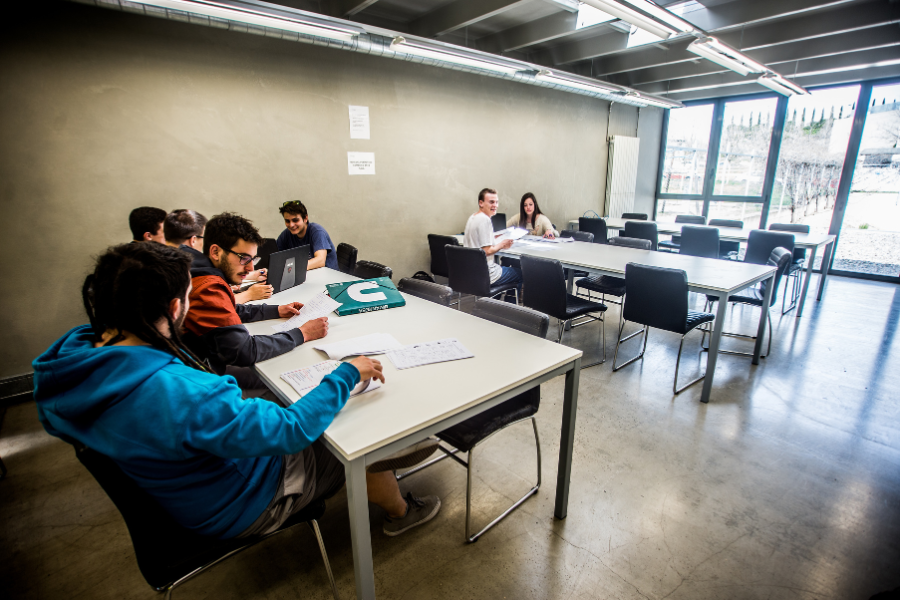Vocational Training is increasingly becoming an accessible and attractive alternative for many students. If you are wondering why study a training cycle, in this Unihabit article, we will go into detail about the different reasons why studying VET can become a great alternative to a university degree.
What is the training cycle?
But before we start going into detail about vocational training, let’s take a look at what is a vocational training cycle? A training cycle is a training system that stands out for its practical training and its proximity to the professional field. In other words, it is the training that directly prepares students for a professional development oriented to the high demand of the labour market in a specific profession.
What are the differences between an Intermediate and Higher Level Training Cycle?
The main difference between an Intermediate Level Training Cycle and a Higher Level Training Cycle lies in the level of the qualification obtained at the end of the studies. While the Intermediate Level Training Cycle offers the title of Technician, students with the title of Higher Level Training Cycle will obtain the title of Higher Technician.
An Intermediate Level Training Cycle is the intermediate training between secondary education and higher education. This type of training is aimed at those students who have graduated from Compulsory Secondary Education and lasts between 1 or 2 years, depending on the specialisation.
However, a Higher Level Training Cycle is the highest level of Vocational Training available, as it provides students with more advanced knowledge and specialisation in their chosen field. In order to access this type of cycle, students must have at least a baccalaureate degree or the qualification of an intermediate cycle. Generally, it lasts between 2 and 3 years, depending on the specialisation of each cycle.
In addition to the degree, the competences and skills acquired in both vary, since in a Intermediate Level Training Cycle the knowledge is obtained in order to obtain a solid base and in a Higher Level Training Cycle the knowledge and specific technical skills of the specialisation are deepened. Also, in the workplace, students graduating as a Higher Technician will be able to take on more specialised roles and, therefore, with greater responsibility.

Why study a training cycle?
Without further ado, let’s take a look at the different reasons for studying vocational training.
Greater employability
Nowadays, there are many companies that require profiles with Vocational Training studies. The trend in the labour sector is changing, and this means that new jobs are being created that require more technical professionals with more specific knowledge.
Official qualifications
The Training Cycles offer official qualifications accredited by the Ministry of Education, and are valid throughout the European Union. In addition, the Ministry of Education is promoting Vocational Training, which is expected to increase in relevance and competitiveness in the coming years, facilitating employability.
Duration of training
All intermediate and higher degrees have a maximum duration of 2 years (with the exception of some cycles that can last up to 3 years). This allows students to complete their studies and enter the world of work earlier than a university degree. So, if you are wondering why study VET, this may allow you to choose a cycle as the most suitable alternative to your professional career.
Complementary training
Students who have completed a Higher Level Training Cycle can continue their training, either by accessing a university degree or by completing another Higher Level Degree.
Entry into the labor market
All Vocational Training studies have a bag of work experience hours in work centres. Therefore, students get a great approach to the world of work in which they can apply all the knowledge acquired during this years.
Wide range of training
Thanks to the consolidation that Vocational Training has been acquiring, more and more training cycles cover different disciplines. In addition, the cycles offer different study modalities, from classroom-based, blended, dual and distance learning cycles. This makes it easier for students to combine their studies with other activities or responsibilities.
Affordable education
Of all the advantages, this is one of the most important ones about why to study vocational training. The cost of the cycles is much more affordable and lower than university fees.
Practical knowledge
Vocational Training uses more dynamic and practical methodologies with realistic projects applicable to the workplace. Many cycles leave behind the memorisation tests as an assessment tool used in most universities.
Why study a training cycle? Frequently asked questions
Here are some of the most frequently asked questions about why study VET.
What is Dual Vocational Training?
Dual Vocational Training (FP Dual) is a type of Vocational Training that is characterised by the alternation between the educational centre and the company. In other words, the student receives theoretical training and subsequently performs it in a job, while combining theoretical classes and professional experience.

What is the difference between Dual Vocational Training and Vocational Training internships?
A Training Cycle includes 400 hours of work experience over the two years, while Dual Vocational Training offers around 1200 hours of work experience to be carried out in the workplace.
With what grade can I enter a vocational training cycle?
To access an Intermediate Level Training Cycle it is necessary to have passed Compulsory Secondary Education, to have the Basic Vocational Qualification, to have passed the Baccalaureate or to pass an entrance exam to Intermediate Level Training Cycles.
On the other hand, to access an Higher Level Training Cycle, it is necessary to have obtained the Baccalaureate Diploma, to have passed a ILTC, the university orientation course or to have a university degree or equivalent.
How long do vocational training courses last?
On average, vocational training courses last two academic years, but this can vary.
How do the modules of a training cycle work?
A module is an educational unit that allows structuring the training and learning objectives in the training cycles. The modules together make up a subject and can be spread over the two years of the cycle.

University residences for vocational training students
Our university residences are the best option for both university students and vocational training students. At Unihabit we offer students a comfortable and functional environment so that they can focus on their studies and also easily commute to work centers for their internships.
Unihabit university residences are very well located near both universities and vocational training centers. Therefore, living in a university residence during the two years of vocational training can be a great solution for many students.
If you have any doubts about our university residences, do not hesitate to contact us by phone at 935 953 953 or 608 608 829 or by email at info@unihabit.com.





